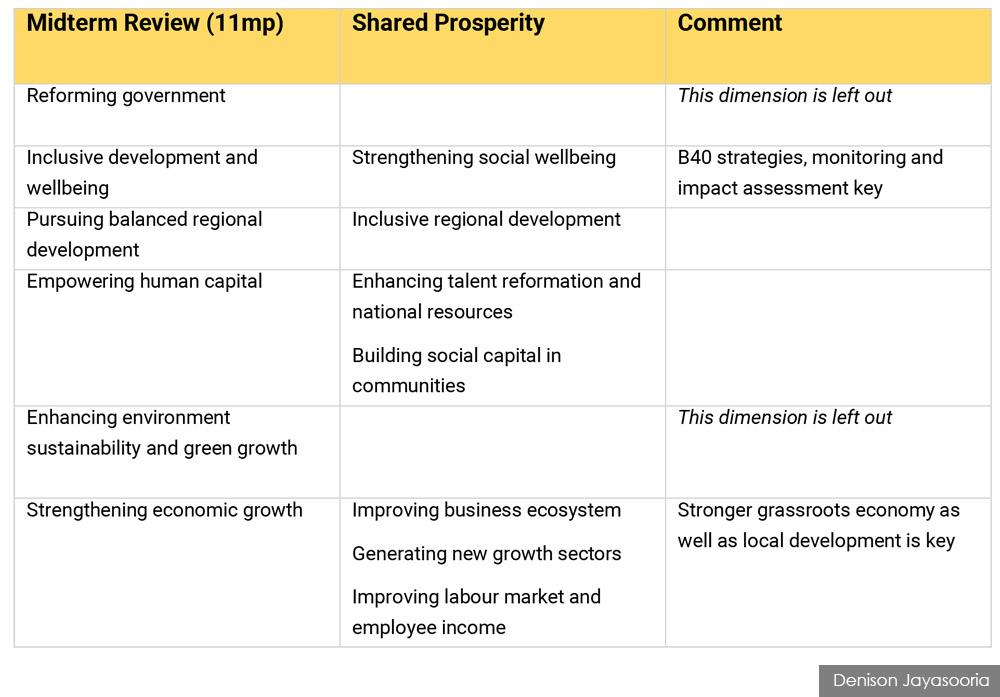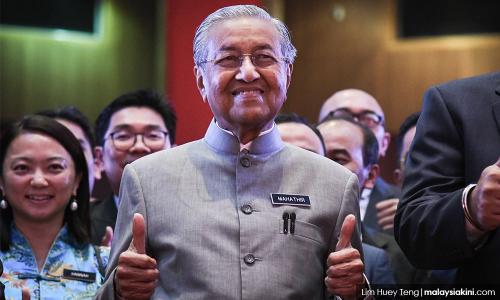A critical review of Dr M's 'shared prosperity' agenda for 2030
LETTER | Prime Minister Dr Mahathir Mohamad delivered an outstanding, honest and visionary speech on May 9.
He was honest about the challenges the government faced politically, conservative about their achievements over the first year, and he set a new economic direction to ensure shared prosperity by 2030 for all Malaysians.
He was honest about the Pakatan Harapan government’s first year in office. It has only accomplished 39 percent of the 464 initiatives undertaken. But on the issue of addressing corruption and abuse of power, it has done well both at institutional reform, recovery of lost funds, as well as charging and bringing former political leaders to trial.
Mahathir took the issues of race, religion, political distortion and distractions head on. He acknowledges the shift in public opinion and the blame game that Harapan has failed to deliver.
I would think this is the first time in a public address we have heard so openly the challenge for Malay-Muslims, a large section of which feels they are being sidelined in development. There seems to be a strong perception that the Harapan government is dominated by Chinese and the DAP.
However, a factual check shows that of the 27 full ministers, 16 (57 percent) are Malays, four (14 percent) Indians, three (11 percent) natives of Sabah and Sarawak, and five (18 percent) Chinese. This means that 68 percent are bumiputera.
So this political contestation has nothing to do with facts, but all about political perceptions. The role of the prime minister and his department has been downsized so as to ensure that he is not too powerful, especially in terms of also holding the finance portfolio.
In this context too, the Economic Affairs Ministry focuses a lot on the Malay agenda institutions, taking it away from the finance minister.
However, these facts are not significant as the narrative that a loss for Umno is being viewed as a loss for Malays. Another major aspect of ministerial allocation in the Harapan government is that it is equally shared by all the four political parties so as to ensure no one party dominates in decision-making.
This was different in under BN, and we know who dominated all the positions, although it was a coalition government.
However, Mahathir's speech, which clearly identified the critical issues and his call for political leaders to stop this distortion of politics of race and religion, fell short of specific institutional reform, which was a thrust in the Harapan manifesto and is urgently needed.
There is a need to introduce hate speech legislation, as well as establish a mediation commission as recommended by the National Unity Consultative Council (NUCC).
Strengthening national unity, social cohesion and harmony is essential, and this thrust is central to all delivery agencies, as well as through an independent National Unity commission as previously recommended. This must also include an independent media council.
Policy thrust
Mahathir set the agenda for the 12th (2021-2025) and 13th Malaysia Plans (2026-2030) theme thrust – shared prosperity.
Prosperity can be understood as more than just high income including social wellbeing. It is ensuring that in the economic growth we will experience, a fair and just equitability share for all the communities so as to ensure that no one is left behind.
It is significant that in this shared prosperity, the disaggregated indicators of class, race, geographical location are specifically highlighted, but gender and age were not included.
Women are among the poorest in society. Unemployment and underachievement primarily affect youth, and the ageing population without social protection are vulnerable and in danger of being marginalised or left behind.
The Sustainable Development Goals (SDGs) which Malaysia has adopted has a better disaggregated measurement in SDG 10:2 “age, sex, disability, race, ethnicity, origin, religion or economic or other status”. The shared prosperity agenda must address these concerns too.
Also positive that there is a major departure with measurement of national growth not just by GDP indicators but also human wellbeing.
The minute Mahathir mentioned the seven thrusts in his speech on how to achieve this shared prosperity by 2030, I remembered the speech he tabled on the Midterm Review of the 11th Malaysia plan on Oct 18, 2018.
This was just six months ago, and there he highlighted six thrusts. It is important to note what is similar and what is different in this new thrust. What is added and what is left out?

The above table reveals that there is a major shift in the public policy thrust from its original focus as highlighted in Parliament last Oct, where both institutional reform and sustainable development are a major thrusts along with economic growth, human development and social wellbeing.
Here I would like to emphasise that a rights-based approach and framework for development is most essential for addressing both rising inequalities as well as discrimination in an open capitalistic and free market system, which we are operating within domestically as well as globally.
It takes the two aspects of civil and political rights along with economic, social and cultural rights, to ensure shared prosperity and inclusive development for all.
The development thrust and discourse does not separate these into two halves. Therefore the Harapan government is shifting its balanced public policy thrust towards an older model which will create greater inequality among classes, races and regions.
Popular thought is that we need development but not human rights and institutional reform. What the people want addressed are bread and butter issues such as inflation, cost of living and inequalities.
Yes, their concerns are right, but our solution cannot just focus on building the economy and capital markets, it must address the root causes of inequality and discrimination, which are structural.
The development thrust, especially the SDGs, is comprehensive and holistic, not segmented. It is about empowering and promoting the social, economic and political inclusion of all.
Way forward
My proposal is for the government to review the seven and enhance it with two more, which are already majors thrust of the 11MP Midterm Review, namely institutional reform and sustainable development.
A stronger public policy targeting the informal sector, grassroots economies, as well as greater local participation in local development priorities, is key to win the hearts and minds of all local communities.
There is a need for public policy to have a much stronger SDG language in the development agenda and policies as already done in 11MP. It is imperative that all members of cabinet now host discussions with the grassroots on this ‘shared prosperity’ objectives and thrust.
Here is where delivery and implementation is key along with monitoring and impact assessment.
If the civil service at the local authority level are not part of the shared prosperity agenda, nothing is going to change at the ground.
Yes, we would have had a stimulating intellectual discussion at the top, but at the bottom, even the SDG language has not been popularised what more on a grassroots appreciation of a shared prosperity agenda.
The federal government must ensure greater public discussion and ownership, as well as ensure there good bipartisan buy-in at the parliamentary level.
Prof Datuk Dr Denison Jayasooria is the Principal Research Fellow at the Institute of Ethnic Studies (KITA), UKM. He is also co-chair of the Malaysian CSO SDG Alliance
The views expressed here are those of the author/contributor and do not necessarily represent the views of Malaysiakini.
RM12.50 / month
- Unlimited access to award-winning journalism
- Comment and share your opinions on all our articles
- Gift interesting stories to your friends
- Tax deductable
